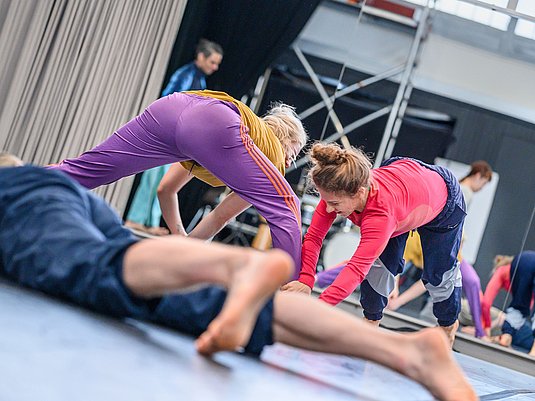Confab
Interdisciplinary platform
CONFAB is an interdisciplinary platform for artistic-choreographic research and mediation. It brings together MA students from different disciplinary backgrounds from different universities and departments. Within the framework of a short residency, project ideas, working methods and questions brought along are deepened and further developed in practical experiments in the work as a group. Finally, they are made accessible to an interested public.
Openness to cross-cutting, body-based work and experimentation
For the duration of a week, CONFAB involves experimenting and researching together on and with the topic and format ideas brought along by the participating students. The conceptual basis is on the one hand the artistic-researching and mediating "doing together". On the other hand, gaining a perspective on one's own practice by being involved in the research (e.g. specific approaches, practices, frames of reference) of others. Questions are deepened and developed in practical experiments in the work as a group. All participants bring each other into the processes. In this respect, a group of students comes together who benefit from the diverse backgrounds of the participants and bring with them an openness to interdisciplinary, body-related work and experimentation.
The process is accompanied by invited artists who themselves work dialogically and interdisciplinarily and have experience in the field of mentoring. The guest artists involved as mentors will provide insights into their practice in input moments. The work plan is in the hands of the group, which organizes itself in consultation with the mentors after a phase of getting to know each other. In this way, everyone can continue to develop their projects. At the end, there is a moment of sharing that is opened up within the university. Some of the previous editions took place in an institution outside the university.
CONFAB is initiated and mainly organized by the MA program Dance Mediation. In recent years, 'dance mediation' has established itself as a term for a diverse interdisciplinary field. Students often work at interfaces to the political, social, but also related to rehearsal processes, training landscapes or artistic research in dance. The focus is on interstices - between contexts, spaces, communities, practices. Here, moments of transmission, transfer, and negotiation take place, and relationships of participating and sharing, of host and guest are moved together.
Next CONFAB
- 29.01. - 03.02.2024
- with Claire Vivianne Sobottke (choreographer, performer and dancer) and Tian Rotteveel (composer, choreographer and performer) as well as Nina Patricia Hänel and Constanze Schellow (FB7:ZZT).
